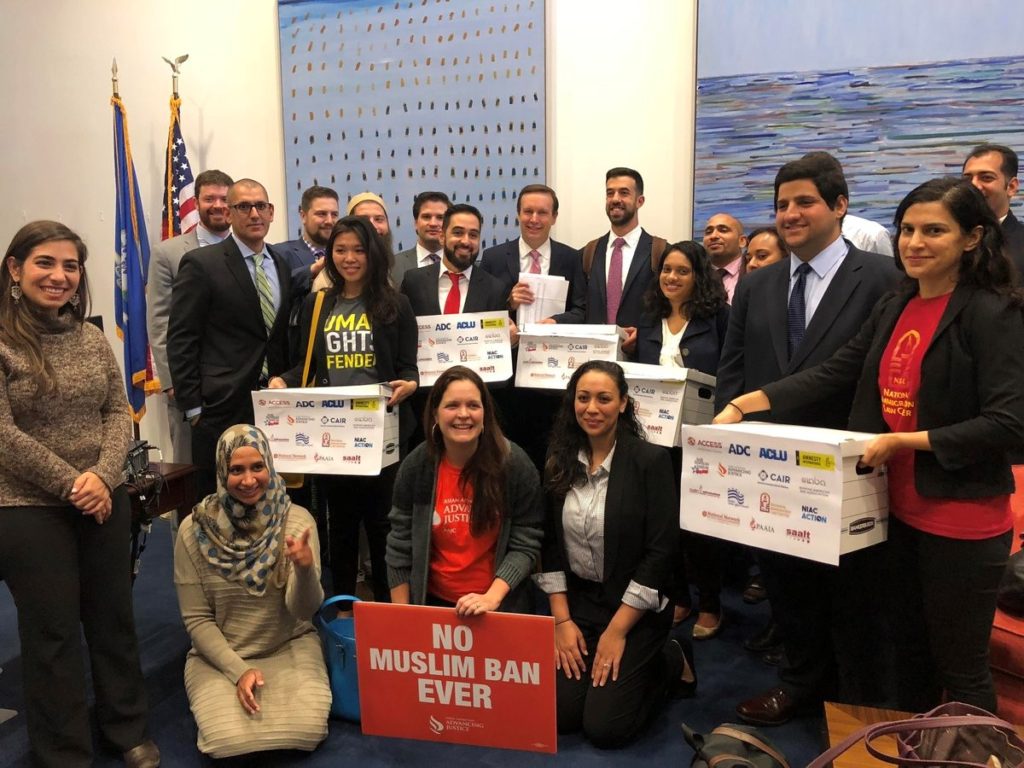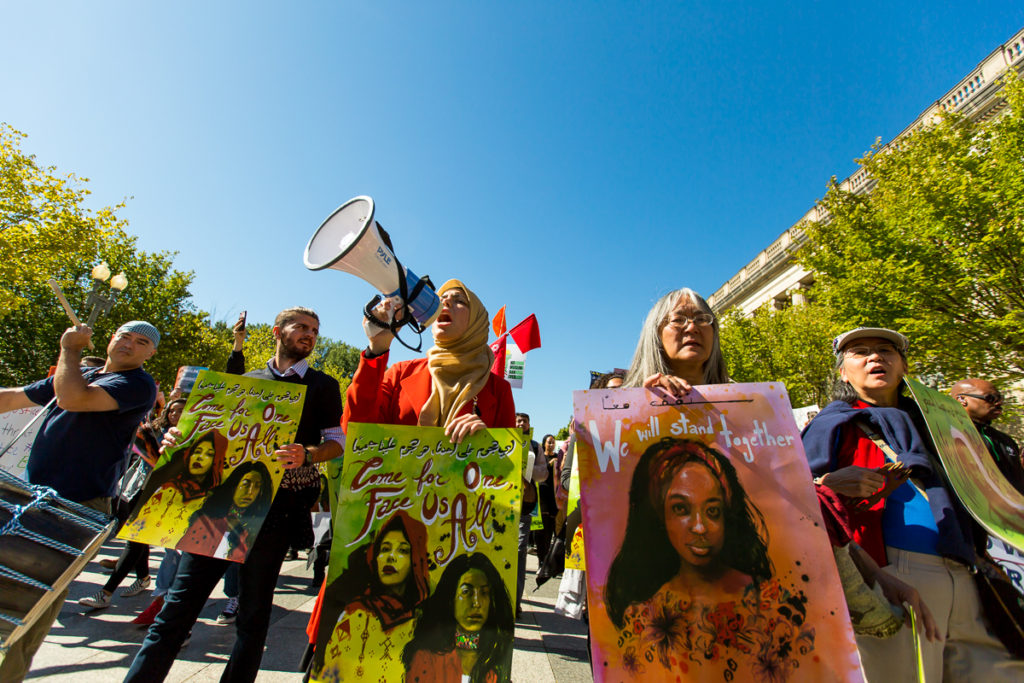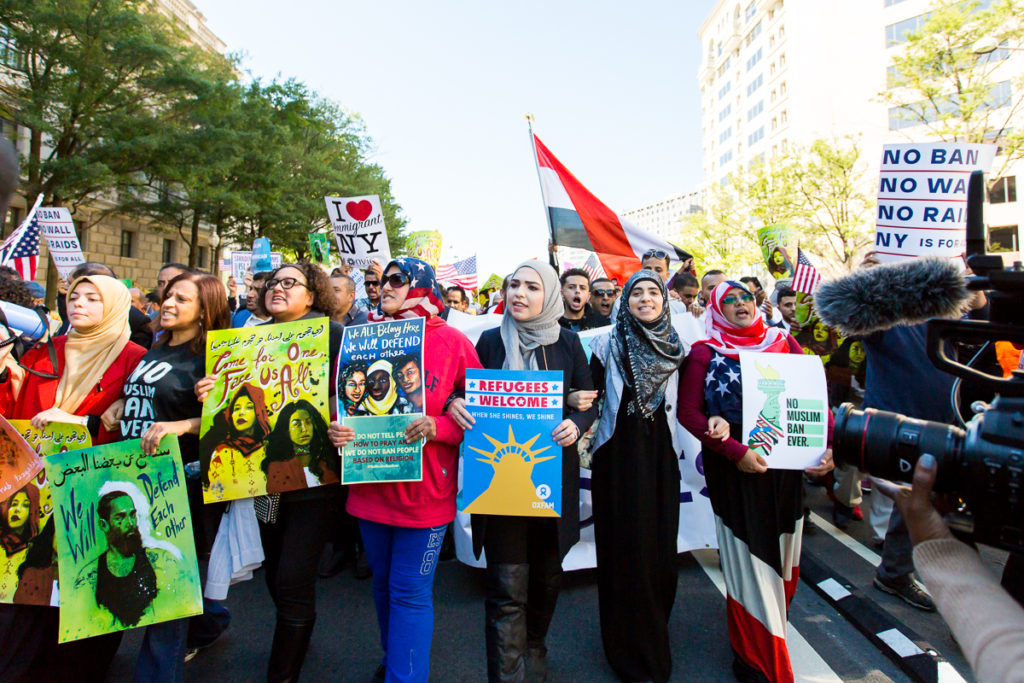Muslim Ban 3.0 and 4.0: How We’re Fighting in the Courts, in Congress and in Our Communities
THE TORCH: CONTENTSBy Subha Varadarajan, NILC Muslim and Refugee Ban Legal and Outreach Fellow
November 9, 2017
We’re winning in the courts in the fight against Muslim Ban 3.0
Once again, U.S. district courts in both Hawaii and Maryland ordered a halt to Muslim Ban 3.0, the latest attempt by the Trump administration to block Muslims from entering the U.S. Muslim Ban 3.0 indefinitely bars nationals from Iran, Libya, Somalia, Syria, Yemen, Chad, North Korea, and Venezuela from coming in to the U.S. (the restriction on people from Venezuela applies only to government officials and their family members).
On October 17, 2017, one day before Muslim Ban 3.0 was supposed go into full effect, a U.S. district court in Hawaii issued a temporary restraining order (TRO) against the ban as it affects people from the six Muslim-majority countries (the TRO does not apply to the ban on travelers from North Korea or Venezuela).
As he had before, the judge in Hawaii concluded that this version of the Muslim ban is an abuse of the president’s authority. In his order granting the TRO, the judge says that the presidential proclamation imposing Muslim Ban 3.0, like the two executive orders that preceded it, “lacks sufficient findings” to justify a policy that applies to more than 150 million people based solely on their being from any of six majority-Muslim countries. The court’s TRO was later converted into a preliminary injunction, which means the block on the ban stays in place as the case winds its way through the appeal process.
On the same day, a U.S. district court in Maryland also issued a preliminary injunction against Muslim Ban 3.0. The injunction exempts from the travel ban travelers from the six Muslim-majority countries who have a “bona fide relationship” with people or institutions in the U.S. Like the court in Hawaii, the court in Maryland also found Muslim ban 3.0 to be an abuse of authority and, further, found that it is unconstitutional because it discriminates against Muslims on the basis of their religion, just as the prior versions of the Muslim ban did.
The Trump administration has not backed down and is appealing the district courts’ decisions, with hearings on December 6, 2017 in the Ninth Circuit and on December 8, 2017 in the Fourth Circuit.. So the fight in the courts continues.
What’s next? Muslim Ban 4.0
On October 24, 2017, the day that the 120-day ban on refugees that was part of Muslim Ban 2.0 expired, the U.S. Supreme Court dismissed the case Hawaii v. Trump as moot.
Just a few hours after this ruling came out, the Trump administration announced Muslim Ban 4.0, which effectively imposes a 90-day ban by requiring refugees from Egypt, Iran, Iraq, Libya, Mali, North Korea, Somalia, Sudan, South Sudan, Syria, or Yemen to undergo extreme vetting measures before they are allowed to enter the U.S. All but two of the countries are Muslim-majority countries, again exemplifying the discriminatory intent of this administration. Are you seeing a pattern here?
“No Muslim ban” actions of October 18
October 18 was a day of action across the country. Over 40 field events had been organized as part of a nationwide campaign, all of them saying NoMuslimBanEver. Each event was part of a larger effort leading up to October 18, the day that Muslim Ban 3.0 was supposed to go into full effect.
Petition delivered to Congress. To kick off the day, a delegation of community organizations delivered a petition with 110,000 signatures to the offices of Senators McConnell, Schumer, Feinstein, and Murphy. This petition asks Congress to create legislation to rescind the newest version of the Muslim ban. That same day, Senator Murphy and Senator Feinstein introduced Senate Bill 1979, declaring Muslim ban 3.0 unlawful and prohibiting funds from being used to implement the ban.
Rally and march in Washington, DC. A few hours later, an estimated 3,000 people from across the U.S. gathered in solidarity against the Muslim ban in Washington’s Lafayette Park. The turnout was amazing and vibrant. First to speak was Holly Yasui, daughter of Minoru Yasui, who challenged the U.S. government’s internment of Japanese Americans during World War II. Holly connected the horrific policies that her father fought against to what is happening with the Muslim ban. The speakers who followed her represented different communities that have been directly impacted by the ban and spoke about its harm and their commitment to challenging any form of a Muslim ban.
After the rally, the speakers led a march from Lafayette Park to the Trump International Hotel on Pennsylvania Avenue. Marchers included interfaith and community-based allies and, most importantly, thousands of affected community members. This was a Muslim-centered and Muslim-led mass mobilization—something that hasn’t been seen on this scale before in the U.S.—and an opportunity to lift up the faces and voices of those directly affected by these unconstitutional bans.
Once the marchers arrived at the Trump Hotel, there were more speeches and presentations, including from community and interfaith allies as well as directly impacted people. The after-march rally ended on a high note, with spirited chants and a feeling of unity.
October 18 was a momentous day and demonstrated the potential and power of Muslim communities and allies to stand up against unconstitutional, xenophobic, white-supremacist policies from this and any other administration.
Photo credit (march photos): Les Talusan








